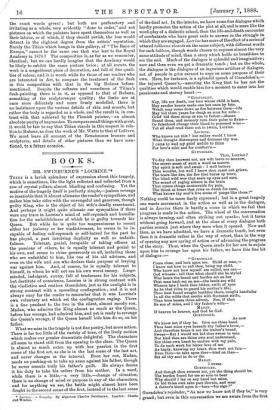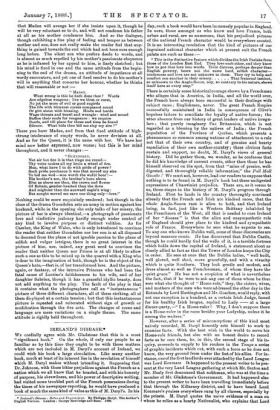BOOKS.
MR. SWINBURNE'S " LOCRINE."
THERE is a lavish splendour of expression about this tragedy, which is sometimes, like the light reflected and refracted from a row of crystal pillars, almost blinding and confusing. Yet the motive of the tragedy itself is perfectly simple,—jealous revenge so insatiable that it almost alienates the reader's sympathies, and makes him take sides with the unvengeful and generous, though guilty King, who is the object of his wife's deadly resentment. And perhaps it might quite alienate our sympathies• if there were any trace in Locrine's mind of self-reproach and humilia- tion for the unfaithfulness of which he is guilty towards his Queen. But while he is quite too magnanimous to resent either her jealousy or her vindictiveness, he seems to be in- capable of feeling self-reproach or self-hatred for the part he has played, a part involving duplicity as well as unfaith- fulness. Tolerant, genial, incapable of taking offence at the passions of others, he is equally tolerant and genial to his own, and seems to shine generously on all, including those who are unfaithful to him, like one of his old advisers, and even on the wife and son who declare their purpose of levying war against him. And, of course, he is equally tolerant to himself, in whom he will not see his own worst enemy. Large. minded, indulgent, sunny, full of tenderness for his subjects, but destitute of conscience, Locrine is in strong contrast with the vindictive and restless Guendolen, just as the sunlight is in strong contrast with a spreading conflagration ; and it is not always easy for the reader to remember that it was Locrine's own voluntary act which set the conflagration raging. There is a fine pendant to the two in the silent, almost moody son, Madan, who admires the King almost as much as the Queen, before her wrongs, had admired him, and yet is ready to revenge the Queen's wrongs, if the Queen herself bids him do so, on his father.
What we miss in the tragedy is not fine poetry, but more action. There is far too little of the variety of tone, of the lively motion which makes our greater dramatists delightful. The characters all seem to stand still from the opening to the close. The Queen is almost as much eaten up with her passion in the first scene of the first act, as she is in the last scene of the last act, and never changes in the intervaL Even her son, Madan, needs no pushing-on to take up arms against his father, though he never resents truly his father's guilt. He always deems it his duty to take his orders from his mother. In a word, while there is a little,—a very little,—change of situation, there is no change of mind or purpose in any of the characters, and for anything we see, the battle might almost have been fought in the second scene of the first, instead of in the last scene
• Locrine : a Tragedy. By .&/gernon Charles Bwinburne. London; Ohetto and Winder. -
As now We know not if they be. Give me thine hand. Thou haat mine eyes beneath thy father's brow,— And therefore bears it not the traitor's brand. Swear—But I would not bid thee swear in vain Nor bind thee ere thine own soul understand, Ere thine own heart be molten with my pain, To do such work for bitter love of me As haply, knowing my heart, thou wert not fain— Even thou—to take upon thee—bind on thee— Set all thy soul to do or die.
MADAN.
I swear.
GIIENDOLEN.
And though thou sworest not, yet the thing should be._ The burden found for me so sore to bear Why should I lay on any hand but mine, Or bid thine own take part therein, and wear A father's blood upon it—here—for sign ?"
Gnendolen's rejoinder, "As now we know not if they be," is very grand; but even in this conversation we are aware from the first
of the final act. In the interim, we have some fine dialogue whiCh hardly promotes the action of the plot at all, and is more like the
word-play of a dialectic school, than the life-and-death encounter of combatants who have great ends to answer in the struggle in
which they are engaged. Locrine has more of the effect of a series of uttered tableaux vivants on the same subject., with different words for each tableau, though words chosen to express almost the very
same attitude of mind, than a story which holds us breathless to see the end. Much of the dialogue is splendid and imaginative ; now and then even we get a dramatic touch ; but on the whole,.
the dialogue is the dialogue of an ingenious artificer of dialogue, not of people in grim earnest to urge on some purpose of their own. Here, for instance, is a splendid speech of Guendolen's,— the injured Queen's,—assuring the King that he has not the qualities which would enable him for a moment to enter into her passionate and stormy heart :— " GumnotEN.
Nay, life nor death, nor love whose child is hate, May sunder hearts made one but once by fate. Wrath may come down as fire between them—life May bid them yearn for death as man for wife— Grief bid them stoop as son to father—shame Brand them, and memory turn their pulse to flame— Or falsehood change their blood to poisoned wine— Yet all shall rend them not in twain, Locrine.
LOCEINE.
Who knows not this ? but rather would I know What thought distempers and distnnes thy woe. I came to wed my grief awhile to thine For love's sake and for comfort's-
GIIENDOLEN.
Thou, Locrine To-day thou knowest not, nor wilt learn to-morrow,
The secret sense of such a word as sorrow.
Thy spirit is soft and sweet : I well believe Thou wouldst, but well I know thou canst not grieve.
The tears like fire, the fire that barns up tears, The blind wild woe that seals up eyes and ears, The sound of raging silence in the brain That utters things unutterable for pain, The thirst at heart that cries on death for ease, What knows thy soul's live sense of pangs like these ?"
Nothing could be more finely expressed; but in a great tragedy one wants movement in the action as well as in the dialogue, and in Loerine there is hardly a scene in which we feel that progress is made in the action. The wheel of the conversation is always turning, and often striking out sparks ; but it turns without going forward, and at the close of every dialogue both parties remain just where they were when it opened. Now and then, as we have admitted, we have a dramatic touch, but even then it is dramatic rather in the way of retort, than in the way
of opening any new spring of action or of advancing the progress of the story. Thus, when the Queen sends for her son to enjoin upon him to revenge her upon his father, we have this fine bit of dialogue :—
" GIIENDOLEN.
Come close, and look upon me. Child or man,—
I know not how to call thee, being my child,
Who know not how myself am called, nor can—
God witness—tell thee what should she be styled Who bears the brand and burden set on her That man bath set on me—the lands are wild Whence late I bade thee hither, swift of spur As he that rides to guard his mother's life; Thou haat found nought loathlier there, nought hatefuller In all the wilds that seethe with flactuant strife, Than here besets thine advent. Son, if thou Be son of mine, and I thy father's wife-
MADAN.
If heaven be heaven, and God be God.
GUENDOLEN.
that Madan will avenge her if she insists upon it, though he will be very reluctant so to do, and will not condemn his father at all as his mother condemns him. And so the dialogue, though exhibiting a fine play of feeling and temper as between mother and son, does not really make the reader feel that any- thing is gained towards the end which had not been sure enough long before. The silent son who prefers deeds to words, and is almost as much repelled by his mother's passionate eloquence as he is inflamed by her appeal to him, is finely sketched ; but his mind is fixed in one and the same attitude from the begin- ning to the end of the drama, an attitude of impatience at all wordy encounters, and yet one of fixed resolve to do his mother's will in anything that concerns her honour, whether he thinks that will reasonable or not :—
" MADAN.
What wrong is this he bath done thee ? Words Are edgeless weapons : live we blest or curet, No jot the more of evil or good engirds The life with bitterest curses compassed round Or girt about with blessing. Hinds and herds Wage threats and brawl and wrangle : wind and sound Suffice their souls for vengeance : we require Deeds, and till place for these and time be found Silence. What bids thee bid me slay my sire ?"
There you have Madan, and from that fixed, attitude of high- strung intolerance of empty words, he never deviates at all. And as for the Queen, it is the same with her. We have her mind now better expressed, now worse ; but this is her mind throughout, and it never changes
GUENDOLEN.
Not air but fire it is that rings me round— Thy voice makes all my brain a wheel of fire. Man, what have I to do with pride of power ? Such pride perchance it was that moved my sire To bid me wed—woe worth the wofal hour !— His brother's son, the brother's born above Him as above me thou, the crown and flower Of Britain, gentler-hearted than the dove And mightier than the sunward eagle's wing : But nought moved me save one thing only—love."
Nothing could be more exquisitely rendered ; but though in the close of the drama Guendolen sets an army in motion against her husband, while in the opening she only talks of her misery, the picture of her is always identical,—a photograph of passionate love and vindictive jealousy hardly enough under control of any kind to involve purpose or distinct volition. As for Camber, the King of Wales, who is only introduced to convince the reader that neither Guendolen nor her son is at all disposed to descend from the plane of not ignoble passion to the plane of selfish and vulgar intrigue, there is no great interest in the picture of him, nor, indeed, any great need to convince the reader that neither Queen nor Prince is at all likely to allow such a one as this to be mixed up in the quarrel with a King who is dear to the imagination of both, though he is the object of the Queen's hate,—that is, of her transformed love. And the picture, again, or fantasy, of the intrusive Princess who had been the fatal cause of Locrine's faithlessness to his wife, and of her daughter Sabrina, though it has a graceful idyllic beauty, does not add anything to the play. The fault of the play is that it contains what the photographers call an " instantaneous " picture of three different characters, all of them striking, all of them displayed at a certain tension ; but that this instantaneous picture is repeated and reiterated without sign of growth or modification through the five acts. The changes of scene and language are mere variations on a single theme. The same attitude is rigidly held throughout.























































 Previous page
Previous page